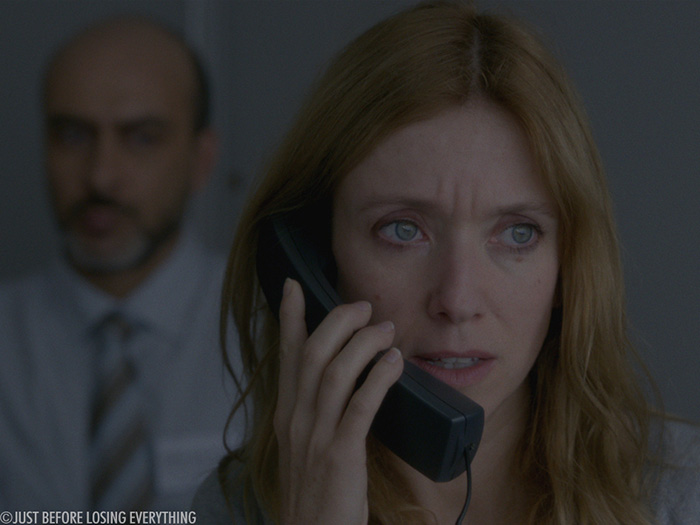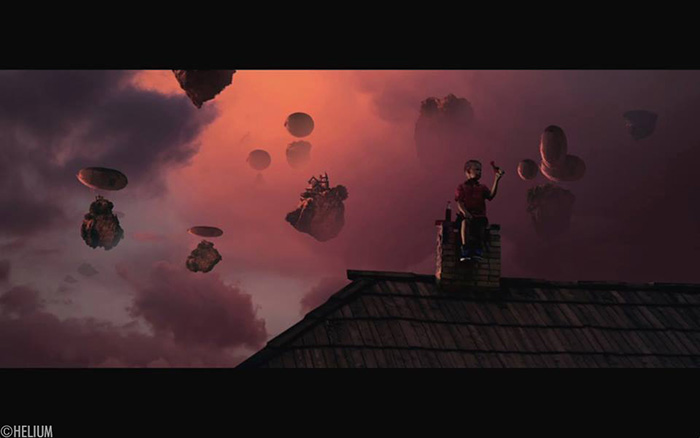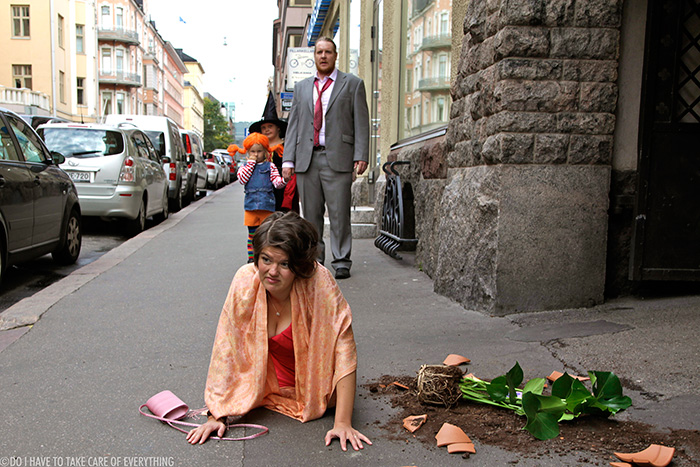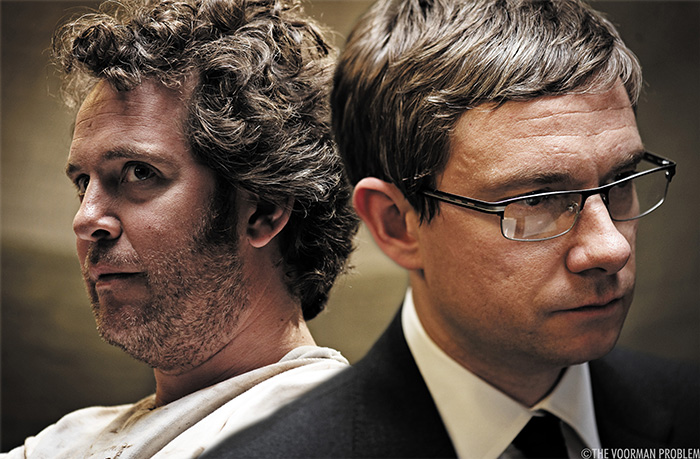Ahead of the Academy Awards, we’re reviewing each short category. See the live-action section below, animated here, and documentary here.

That Wasn’t Me – USA – 26 minutes
If someone told me they didn’t see Esteban Crespo‘s Aquel No Era Yo [That Wasn’t Me] as more than a contrived piece of melodrama tugging at heartstrings I’d believe them and understand completely. However, for me it was an affecting work brilliantly encapsulating the climate we now find our planet caught within. This is war devoid of rules, civil unrest placing automatic weapons into children’s hands, and the naively idealistic foreigners who believe they can enact change with a friendly smile. Crespo doesn’t say what African nation we find Paula (Alejandra Lorente) and Juanjo (Gustavo Salmerón) visiting as doctors to help heal the injured rebels and we don’t need to know. This could just as easily have been set in the Middle East—the story would be the same.
Deserving its Oscar nomination and in my opinion the award itself, the story put onscreen hits all the beats you’d expect it to but not quite in the way your preconceptions would assume. What starts as optimistic Spaniards coming into contact with armed boys guarding a barrier turns to a prison situation where the native general (Babou Cham) could care less about permission, intent, or morality. We believe Juanjo has touched young Kaney (Mariano Nguema) with talk of Ronaldo and fútbol, appealing to his adolescent wonder at celebrity, sport, and fame until the boy’s indoctrination comes fully into focus. People will die, a rape will occur, and all-out war will commence with a military takeover in a hail of bullets and fire. And we will see the face of vengeance through tears.
I know, injecting scenes where an adult African teen is seen and heard speaking Spanish in front of a huge crowd of enraptured listeners is a clichéd device to start our minds reeling in the sense that we must know who survives and who doesn’t. But just because it is cliché doesn’t stop it from being a potent way of getting the point across about just how deep these young “soldiers” have fallen. When you have no home, family, or freedom to live you will become what you must to survive. If being a child of the revolution is your only choice opposite a bullet in the head, you take that gun and kill whomever your general demands.
Would it be easy for us as First World bystanders coming in like we know exactly what’s happening to follow suit when those we love are murdered in cold blood? Yes. But that would make us just as culpable, just as monstrously remorseless. If we’re really to think we know better—that our way of life is superior—then we must also be better. That Wasn’t Me therefore becomes a bittersweet tale of redemption and compassion in the face of blind rage and fear. It is the story of a boy doing the only things he knows how to do until given the chance to be more. We all have the potential for evil and in turn the ability to heal.
A-

Just Before Losing Everything – USA – 29 minutes
Whoa. Xavier Legrand‘s screenwriting and directorial debut Avant que de tout perdre [Just Before Losing Everything] is a tense piece of filmmaking that will have you holding your breath throughout. It starts with a young boy walking the opposite way from school before getting stopped by his teacher. He says he’s buying cigarettes for his father and will be in class soon yet waits at a bridge after she leaves instead until a woman pulls up in her car. From here the two go to another school and add a teenage girl who joins them post-embrace and kiss with whom we can assume is her boyfriend. The trio drives to the woman’s place of work, the kids get left with a friend, and she searches for the owner to plan what has now very distinctly become an escape.
Legrand keeps all detail very close to the chest as this cinéma vérité thriller continues with palpable fear and an adrenaline rush getting Miriam (Léa Drucker) through her tragic circumstances before she breaks down and decides against what must be done. We don’t know what her husband Antoine (Denis Ménochet) has done until there is no more hiding the evidence. We don’t know if young Julien (Miljan Chatelain) knows exactly what’s happening or how Joséphine (Mathilde Auneveux) is coping with a very near future uprooted from the only life she’s ever known. All we know for sure is the pained, sympathetic looks of co-worker Gaëlle (Anne Benoît) and disappointed but understanding boss Mr. Savelli (Christian Benedetti). This is something they condone and something absolutely necessary.
So much is said with very little time or dialogue as what was hoped to be a simple extraction turns into a cat and mouse chase of excruciatingly difficult subterfuge and emotional distress. Drucker is a revelation, subtly keeping together in order for her strength to transfer to her children save for one momentary unraveling into tears. We see how scared she is and know her decision wasn’t taken lightly, especially once pieces of the horrors at home come into focus. Saying much more will ruin the tense impact of this distilled moment of terror and hope for salvation so I’ll just give special note to Benoît and co-worker Sophie’s (Claire Dumas) performances as the danger comes to them. Until the film officially cuts to black, you’ll truly have no idea whether Miriam’s fate is freedom or destruction.
A

Helium – USA – 23 minutes
What do you tell a young child dying of an inoperable disease? Do you fill his/her head with religious concepts of heaven and hell, explaining how innocence and youth guarantees a place in the former’s angelic clouds? For a kid like Alfred (Pelle Falk Krusbæk) that’s simply not enough. Heaven is just a place—a sterile, overused destination he finds boringly clichéd and trite rather than some grand resting place someone who’s lived a long, fruitful life strives to achieve. He hasn’t lived, hasn’t had the opportunity, and to a cynical mind is being prevented from doing so by the exact same God his parents and doctors tell him is waiting with open arms. No, an imagination like Alfred’s needs more than the idyllic story those around him pretend provides comfort for anyone but them.
That’s how the titular locale of Helium takes shape—a magical world of adventure and wonder a boy surrounded by model blimps can grab ahold of and wish to find. A construct of new custodian Enzo (Casper Crump), this place becomes an alternative to heaven with personalized plots of land floating by balloons and populated with deceased family members waiting to play upon his arrival. It’s a glimmer of hope for a child who had none, one conscious of his fate and helpless to conform to generic beliefs. I’m not saying Catholicism is fiction (although I probably would in another context), but it most certainly is for a child who hasn’t grown up in the church to truly discover faith. Why not give him a new, more palatable “lie” if it makes him smile?
Writer/director Anders Walter has crafted a touching piece full of humanity and compassion courtesy of Enzo understanding little Alfred rather than placating him. You see the excitement in the boy’s eyes when Helium is introduced not only as a place to remind him of his room (tomb), but also as a creation he himself drew. Salvation is made real in his eyes through the lovingly told tale at his bedside complete with bright red balloon dog serving as his ticket aboard the Express. Both he and Enzo learn what it means to be human if only allowed each other’s company for a short few days. And with each fantasy vignette playing from behind Alfred’s closed eyes, we catch a glimpse of that hope. Not for his parents or the doctors alleviating their own pain and guilt, but for the boy himself.
A-

Do I Have To Take Care Of Everything? – USA – 7 minutes
You’ve probably heard these words before: Pitääkö mun kaikki hoitaa? [Do I Have to Take Care of Everything?]. It might have been your wife, girlfriend, or mother (or the male equivalents despite it being a generalization stereotypically placed upon the fairer sex) and I’m sure they were correctly using those frustrated sentiments more often than not. But while building a seven-minute short around that phrase would be funny in any context if only for the incredulity of whoever utters it, writer Kirsikka Saari and director Selma Vilhunen take it one step further. You see, while Sini Ketonen (Joanna Haartti) may say the words without a shred of patience, she is actually the one responsible for everything that goes wrong.
The film begins in hilarious fashion as Sini and her husband Jokke (Santtu Karvonen) get startled half awake by the alarm. Rather than coherently shut it off, though, she asks him to pass the clock to her, speaks into it like a telephone, and goes back to sleep. It’s no surprise then that she wakes in a panic to realize they are late for a wedding. What follows is a lightning round of morning readiness as Sini runs around the house making sure Jokke wears the correct tie and young Ella (Ranja Omaheimo) and Kerttu (Ella Toivoniemi) find their dresses. As far away from as simple as that sounds, they soon become the weird family running down the street towards church with a plant in hand and the worst luck anyone could ever have.
If you’ve guessed what the punch line will be, you’re right. But only half right since Saari and Vilhunen have one more surprise in store after the obvious reveal. Brilliantly acted in a panicked rush and perfectly art directed for domesticity and all the pratfalls of having way too much on your mind at one time, Do I Have to Take Care of Everything? keeps you as breathless as the characters. The jokes are subtle, absolutely relatable, and authentically rendered by all involved from Karvonen’s calm acceptance of his wife’s demands to both girls cashing in on the cuteness of youthfully misunderstood context. The true star, however, is Haartti never stopping until the last “whoops” finally registers the rest in her mind. It’s so funny because it’s so familiar.
B+

The Voorman Problem – USA – 13 minutes
It’s an Oscar nominated short film and yet I thank The Voorman Problem not for its entertaining wit or Martin Freeman‘s outburst of hilarity at its end, but instead for it cementing my need to start reading David Mitchell. Yes, the author of Cloud Atlas is the main inspiration behind director Mark Gill and cowriter Baldwin Li‘s movie courtesy of it being an adaptation of an excerpt from the novel number9dream. Detailing the encounter of a psychiatrist named Dr. Williams (Freeman) and an imprisoned patient who believes he is God (Tom Hollander‘s Mr. Voorman), the story set forth is a character actor’s dream of dryly black humor with a tinge of thought-provoking “huh?”
The problem with Voorman is not his supposed delusion, but actually the fact that he’s converted the entire populace of inmates into believing him. All Governor Bentley (Simon Griffiths) needs is for Williams to label the man insane so he can whisk him off to the asylum and never have to deal with his antics again. A consummate professional, however, the good doctor engages the mad man in a straightjacket much to the latter’s delight. Crazed or omniscient, the reaction is exactly what you’d expect. He’s either giddy at his insanity being tolerated by someone across the room or simply having a laugh as he forces one of his creations to dance with his every whim. And if Williams won’t believe him, well Voorman will just have to prove it. By making Belgium disappear.
It’s a brilliant farce taken to its extreme with two central roles fitting precisely in the wheelhouse of their respective performers. Hollander can’t help himself from flashing that sarcastically knowing smirk we’ve seen through ruthlessness in Hanna and bureaucracy in the Pirates films while Freeman’s everyman utilizes his trademarked speechless pause honed in The Office and still prevalent today in The Hobbit. If there is one thing wrong with the piece it is that it isn’t longer so their exchanges could stretch out into more “is it or isn’t it real” commentary until the truth can be revealed. But then it probably wouldn’t be as effective in its concise plot progression pitting true intelligence against a construct of the word. After all, “smart” is meaningless when the reality labeling it so isn’t a fixed one.
B
The Oscar Nominated Shorts are now showing in limited theatrical release. See the official site for more details.

